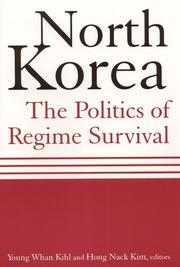| Listing 1 - 10 of 46 | << page >> |
Sort by
|
Book
ISBN: 9781138654938 9781315178318 9781351712989 9781138452367 Year: 2017 Publisher: London Routledge
Abstract | Keywords | Export | Availability | Bookmark
 Loading...
Loading...Choose an application
- Reference Manager
- EndNote
- RefWorks (Direct export to RefWorks)
A UN arms embargo has been in place against North Korea for nearly a decade, as part of a broader sanctions regime designed to deny it the goods and funds needed to fuel its nuclear weapons and ballistic-missile programmes. Yet despite these sanctions, a host of state and non-state actors continue to buy arms, materiel and services from Pyongyang - and inject funds into the same coffers that drive North Korea's nuclear and missile development. While some of North Korea's military customers in the sanctions era since 2006 are well known - such as Iran, Syria and Burma - Pyongyang's wider client base receives little international attention. North Korea has continued to enjoy access to other defence markets across Africa and the Middle East. The drivers of these clients' decisions to buy weapons and related goods from North Korea are rarely discussed. This gap in analysis is essential to fill. If tailored and effective approaches are to be developed to convince North Korea's customers to buy elsewhere, they must be based on a sound understanding of the considerations that motivated the client to turn to Pyongyang in the first place. This book comprehensively analyses the available information on these procurement decisions. It concludes, contrary to conventional wisdom, that the reasons that customers buy weapons and related goods and services from North Korea vary, often greatly. This study also concludes that one of the greatest achievements of the UN sanctions regime to date has been to deny North Korea access to modern conventional weapons technology that it can learn to manufacture at home and sell on to its clients around the world. Without more contemporary wares to tempt foreign buyers, North Korea will likely continue to see its client list of weapons and related goods and services shrinking.
Book
ISBN: 9782491813154 Year: 2022 Publisher: Paris : Nanika.
Abstract | Keywords | Export | Availability | Bookmark
 Loading...
Loading...Choose an application
- Reference Manager
- EndNote
- RefWorks (Direct export to RefWorks)
Book
Year: 2005 Publisher: Seoul : Korea Institute for National Unification,
Abstract | Keywords | Export | Availability | Bookmark
 Loading...
Loading...Choose an application
- Reference Manager
- EndNote
- RefWorks (Direct export to RefWorks)
Book
Year: 1996 Publisher: Seoul : Research Institute for National Unification,
Abstract | Keywords | Export | Availability | Bookmark
 Loading...
Loading...Choose an application
- Reference Manager
- EndNote
- RefWorks (Direct export to RefWorks)
Book
ISBN: 898750901X Year: 1997 Publisher: Seoul : Korea Institute for National Unification,
Abstract | Keywords | Export | Availability | Bookmark
 Loading...
Loading...Choose an application
- Reference Manager
- EndNote
- RefWorks (Direct export to RefWorks)
Book
ISBN: 9791021031449 Year: 2018 Publisher: Paris : Tallandier,
Abstract | Keywords | Export | Availability | Bookmark
 Loading...
Loading...Choose an application
- Reference Manager
- EndNote
- RefWorks (Direct export to RefWorks)
Faut-il avoir peur de la Coree du Nord ? Les dirigeants nord-coreens sont-ils fous ? Comment la Coree du Nord est-elle devenue la premiere dynastie communiste du monde ? Comment vit-on aujourd'hui en Coree du Nord ? Derriere les menaces nucleaires, que veut vraiment Pyongyang ? L'intensification des essais nucleaires et des tirs de missiles balistiques menes par le jeune leader Kim Jong-un ravive plus que jamais les tensions en Asie du Nord. Systematiquement diabolisee, la Republique populaire democratique de Coree reste pourtant une enigme pour les Occidentaux. En 100 questions, les auteurs racontent l'histoire ancienne pour eclairer le present, decryptent l'impuissance de la communaute internationale face aux provocations de Pyongyang et nous revelent une societe en pleine mutation, decidee a entrer dans la modernite.

ISBN: 1403933243 Year: 2004 Publisher: London International Institute for Strategic Studies
Abstract | Keywords | Export | Availability | Bookmark
 Loading...
Loading...Choose an application
- Reference Manager
- EndNote
- RefWorks (Direct export to RefWorks)
Book
ISBN: 9781910777145 Year: 2020 Publisher: Warwick : Helion,
Abstract | Keywords | Export | Availability | Bookmark
 Loading...
Loading...Choose an application
- Reference Manager
- EndNote
- RefWorks (Direct export to RefWorks)
This book seeks to bring order and coherence to the chaotic state of affairs in the intelligence community of North Korea-watchers, as well as to disprove the much-echoed stance that there is little to fear from the DPRK by providing information on a plethora of never-before described weapons systems and modernisation programmes. The book maps the most important events from the inconclusive ceasefire struck at the end of the Korean War, throughout the Cold War until modern day, and an especially heavy emphasis is placed on the current status of the Korean People's Army by examining their wealth of indigenously-designed weaponry. In the course of the book not only are many of the Korean People's Army's most secret projects and tactics unveiled, but also new light is shed on the deadly flare-ups between the North and the South, and novel evidence on tragic incidents such as the Cheonan sinking and Yeongpyeong bombing of 2010 is brought forth.

ISBN: 0765616386 Year: 2006 Publisher: Armonk, NY : Sharpe,
Abstract | Keywords | Export | Availability | Bookmark
 Loading...
Loading...Choose an application
- Reference Manager
- EndNote
- RefWorks (Direct export to RefWorks)
Book
Year: 1994 Publisher: Seoul : Research Institute for National Unification,
Abstract | Keywords | Export | Availability | Bookmark
 Loading...
Loading...Choose an application
- Reference Manager
- EndNote
- RefWorks (Direct export to RefWorks)
| Listing 1 - 10 of 46 | << page >> |
Sort by
|

 Search
Search Feedback
Feedback About UniCat
About UniCat  Help
Help News
News